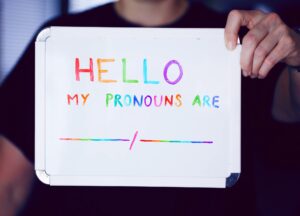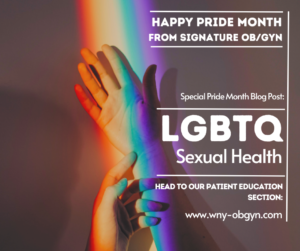By Iris Farrou
18 Sep, 2023
Diet & Exercise, Lifestyle Tips, Mental Health, Prevention, Queer Health, Reproductive health, Sexual health, Women's Health, Young adults & teens
Bisexual, Buffalo NY, Gay, Gender Identity, gender non-conforming, healthcare, How do I find a gynecologist if I'm LGBTQ, How do I find an LGBTQ doctor, Inclusive OBGYN Care, Lesbian, LGBTQIA+, Non-Binary, OBGYN for queer couples, Queer Friendly Doctor, queer health, Queer-Friendly OBGYN, sexual orientation, Transgender

If you belong in the LGBTQ community, you probably know that coming out is constant and not a “rip off the bandaid processm,” as it happens every time you meet someone new. Seeking a medical provider, and specifically an OBGYN, as a queer person can be challenging; if you already have a provider but have not discussed your sexual orientation or gender identity with them, it may be time to prepare for a coming out discussion.
Why does it matter?
It’s understandable you may want to avoid another discussion about your sexual orientation and/or gender identity, but when it comes to healthcare this is vital information so you can get the best possible healthcare. A queer ally doctor would be knowledgeable on the health risks a queer person faces. If you are seeing an OBGYN, being open with them about your sexual orientation is important in getting the care you deserve: proper exams and vaccinations, contraceptive methods (if needed), safe sex and risk factors education, and other preventative care. For example, if you are a lesbian couple trying to conceive, your OBGYN should be your strongest advocate in this process. If you are transitioning, your OBGYN should oversee your hormone intake and be there for you through your hormone replacement therapy, helping you remain healthy both physically and mentally.
How to Find a Queer-Friendly Provider
Whether you are considering coming out to your current doctor or looking for one, it’s good to look for queer friendly signs in a practice: you can inquire whether they have LGBTQ+ patients, or if there are doctors who focus on queer health and are more knowledgeable and experienced. You can also ask for referrals through your community: especially when it comes to finding an OBGYN, word of mouth and personal credibility go a long way. If you are nervous about your initial appointment you can ask a friend or trusted family member to come with you. Sometimes you can also authorize your partner or spouse to speak with your doctor on your behalf about certain matters–should you feel comfortable doing so–or be with you during the appointments.
What Should Providers Do?
Don’t think this should be a one-way street: not all falls on you when you want to ensure a practice is queer friendly. Providers can specifically showcase they are LGBTQ friendly, and a safe space, by doing some of the following:
- Displaying equality symbols in their office and/ or website
- Specifically stating they are knowledgeable about the LGBTQ community and are allies
- Have a visible non-discrimination statement
- Customize their patient intake forms to be appropriately inclusive
Meet the Standards of Practice: a set of recommendations created by the Massachusetts Department of Public Health to improve LGBTQ access to quality care
More
By Iris Farrou
19 Jun, 2023
Fatherhood, Mental Health, Parenting, Queer Health, Reproductive health, Sexual health, Women's Health, Young adults & teens
Adolescents, Ally, Bisexual, Gay, Gay-Straight Alliance, Gender Identity, Gender Terminology, Gynecologist, Gynecology, health, Helping my LGBTQ child, Inclusive Sexual Health Education, Intersex, Lesbian, LGBTQ, LGBTQ Youth Support, LGBTQIA+, Neurodivergent, Non-Binary, OBGYN, Pre-Teen, Pride Month, Pronouns, Queer, Sexual Behavior, Teen, Teenagers, Transgender, Youth

Most parents nowadays try to ensure their kids have a well rounded education when it comes to sexual health and safety, and “the talk” has been appropriately modified–in most households–to expand beyond the heteronormative model of sexual intimacy. Teenagers are exposed to diverse models of relationships, and abundant resources are available for those who explore their sexual and gender identity.
Despite the positive rise, the statistics on LGBTQ-focused sex ed in schools remain low. In a 2015 survey only 12% of the Millennial participants reported that their school’s sex ed curriculum covered same-sex relationships–and that’s not even discussing sexual or gender identity. It becomes clear, then, that it is up to parents and medical professionals to be more educated, to be better allies to LGBTQ kids and youth, and to be a safe space for them. According to the National Center on the Sexual Behavior of Youth “children’s sexual awareness starts in infancy and continues to strengthen throughout preschool and school-age years,” so no matter how young your child is, they know what’s going on with their body and it is your job as a parent to support them.
How can I be an Ally?
Just as it is with any support system, the best way to be an ally is to educate yourself; on LGBTQ history, sex and gender terminology, legal issues, local issues in your city, school issues that may have come up in your child’s school. LGBTQ youth are more likely to be bullied in school, and to search for information on the internet– which often leads them to not credible sources.
- Be a Visible Safe Person: it is important to show your kids you are supportive of the LGBTQ community, and that you are open to conversations about sex and gender. This can be as simple as bringing home a book about queer issues, or a pamphlet from your local Pride Center; you can also initiate conversations about the history, rights, and health of the LGBTQ community. Even a film night is a great way in!
- Support Local Queer Organizations: if there is a Gay-Straight Alliance (GSA) at your child’s school, be an active participant in their efforts for inclusivity, policy, and curriculum changes. If there is a Pride Center where you live, take your kids to family-friendly events. Should a Pride Parade happen in your town or nearby, go the extra mile, or walk the rainbow mile with your kids.
- Provide Reading Materials: just like with any topic, there are age-appropriate books for your child to help them learn more about the LGBTQ community. Visit your local bookstore and ask for the latest publications, and take a look at The Rainbow Collection of the American Psychological Association: https://go.maginationpress.org/rainbow-collection/
- Be a Source of Knowledge: it is impossible to be an encyclopedia for everything your child asks you. But for topics on which misinformation is rampant, is it not important to be a trustworthy source of knowledge? The CDC has an excellent LGBT Health page you can consult as a “crash course,” and they also have a list of regional LGBT Health Services.
Use the Right Words: when your child first becomes interested in their body, or if your toddler or pre-teen asks questions, you can expand the discussion and include appropriate terminology to talk about gender, and talk with them about how pronouns are important outside of their grammar exercises. If your teen is being more direct with their questions, the Gay, Lesbian & Straight Education Network (GLSEN) can help you and them on Inclusive Sexual Health Education, and they can also visit a well-researched and peer-edited page written for teens by teens: https://sexetc.org/
More


